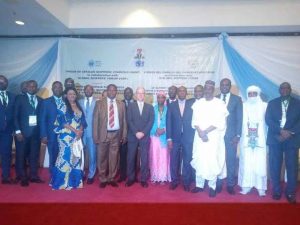Nigerian importers paid N67.4bn surcharges to shipping lines in 2017, says Nigeria Shippers Council
Samson Echenim in Abuja
The Union of African Shippers Council (UASC) and Global Shippers Forum are currently meeting in Abuja to seek ways to end multiple surcharges levied on goods coming into ports of West and Central African ports.
The sub-regional summit on unfair shipping surcharges and high local shipping charges at the ports of West and African sub-region is being hosted by the Nigerian Shippers Council, at which the various member shippers councils took turns to narrate peculiar surcharges being suffered by their importers in the hands of international shipping lines.
Surcharges are extra fees or imposition of additional charges on freight prepaid either due to operational delays, rents or other factors. Surcharges may be directly imbedded in the freight prepaid or in addition to freight charged by shipping lines.
According to the Nigerian Shippers Council, which presented a paper tilted, “Impact of unfair shipping surcharges and high local shipping charges on national economies of West and African states: Nigeria as a case study,” surcharges in Nigerian ports could raise trading costs by 23.5 percent.
Typical global surcharges, according Drewry Freights Rates Insight, 2019, include Bunker Adjustment Factor (BAF), Origin Terminal Handling Charge (OTHC), Destination Terminal Handling Charge (DTHC) and Currency Adjustment Factor (CAF).
However, the Nigerian Shippers Council identified 16 different surcharges to Nigerian ports as at 2017 on goods from Europe alone and 12 local charges, saying that shipping lines place surcharges on cargoes to the country arbitrarily and some of the surcharges have remained permanent. For instance, the council said Nigerian importers paid a whopping $166.9 million on Peak Season Surcharge and $267.1 million congestion surcharge in 2017. According to statistics from the council, Nigerian importers paid a total of N67.45 billion surcharges in 2017.
James Hookham, director, GSF, who presented a paper on GSF surcharges campaign, enumerated the efforts being made by the forum to tackle surcharges by shipping lines. According to him, the cost of running shipping lines are constantly going up, with the sea carriers now using surcharges to cushion the effects of costs of maintaining their businesses.
He however said the Global Shippers Forum has been in the business of checking surcharges, for which it at the Colombo 2016 annual meeting adopted to influence renegotiation of Incoterms 2020; educate shippers on optimum use of Incoterms; and raise awareness of global bodies on impact of surcharges on cost of exports and imports in selected economies.
“We also adopted to extend investigations to charge imposed by ports and stevedores (THCs); expose basis for surcharges to provide transparency and ensure legitimacy as well as to promote quotation of all inclusive freight rates by shipping lines,” Hookham said.
Hookham believes that while surcharges may not be eliminated, its basis and purpose could be made more understandable and transparent.
Giscard Ogoula, secretary-general of the UASC West and Central Africa sub-region, speaking on how his organization intends to check the multiple surcharges said, “We have to request to have the components of these charges. Secondly, we will put together all the technical issues involved so that we can be able to find specific solutions to each of them.
“The third thing we will do is to consolidate our relationship with GSF to deal with the issue of multiple surcharges at its conference coming up later in the year in London. We wish to be invited to the London conference to make our contribution and relate the peculiar surcharges and all issues around it. Then we should work on our transport cost element. We should be able to put in place, a framework for negotiation. I think, as a sub-regional body of shippers council, we should be able to negotiate deals with multinational shipping lines,” he stated.
Hassan Bello, executive secretary of Nigerian Shippers Council and host of the UASC/GSF summit, called on African shippers and shipping councils to mind the various Incoterms as they are international trade terms that bind, not only the developed worlds, but also countries in Africa.
“Incoterms are made by international body. We should pay attention to them. So, we need to go back to the drawing board and make sure the interests of our nations are included,” he said.








